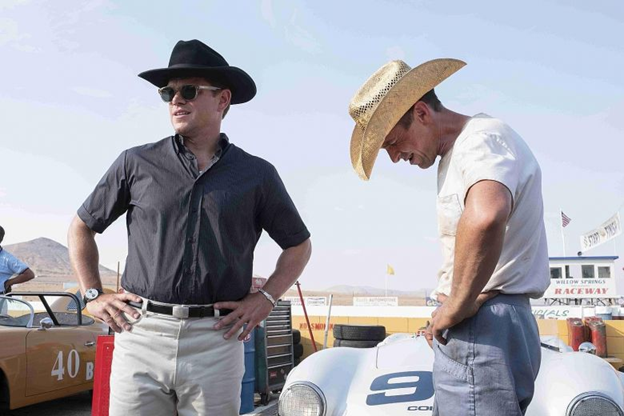I didn’t want to watch this movie. To me this seemed like #oscarssowhite fodder, like the only awards contender a suburban dad would see, a snoozefest I couldn’t possibly enjoy. The aesthetic seemed to rely heavily on pie-in-the-sky early ‘60s nostalgia, the sugary post-war patriotism that encourages those educated with heavily edited history books to yearn for the good ol’ days. Why this story and why now? How could FORD V. FERRARI compare to the swath of daring, socially conscious films I’ve seen of late? To top it off, I have no interest in cars, nor was I at all familiar with the true story it’s based on. But lately I’m trying to broaden my horizons and push past my biases, rather than to dismiss things as “not for me.” It’s a fact that this movie is very white and male (there is actually a scene where one white man hits another white man in the face with a bag of Wonderbread), but it turns out it wasn’t what I expected. Though not perfect, FORD V. FERRARI is full of fantastic storytelling choices that push it past being a generic star-studded drama, and provide a decent amount of depth for the die-hard motorsports fans and the uninitiated alike.

These tacky cowboy hats were a deterrent for me
I must start by saying that FORD V. FERRARI is a misleading title. It makes it seem like the main conflict in this story is two major car companies battling it out with a shade of Americans versus Europeans as the undercurrent. I expected to roll my eyes as the music swelled in the aftermath of a clean-cut American victory, I expected borderline propaganda. And it easily could have been. However, there is much more to the story than I thought. It could have taken the tacky route, and I’m glad it didn’t. Outside of North America, the title of this movie is LE MANS 66—a confusing title to race car noobs but perfectly apt once you get the full story. It really is less about the Ford company or the Ferrari company, and much more about Ken Miles (Christian Bale), a man who raced for Ford in the 1966 24 Hours of Le Mans car race, and Carroll Shelby (Matt Damon) the man who helped him to build the legendary car.
The 24 Hours of Le Mans is no joke. It is quite literally 24 hours of racing; the ultimate test in endurance. The film opens on Carroll Shelby’s last go at the Le Mans, at which point I asked myself—am I enjoying watching a fast car go for the first time in my life? Every racing scene in the movie is shot and edited so sleekly, it takes you along for the ride. The speed is felt through the screen. And there’s plenty of opportunity for super intense behind-the-wheel acting, a skill I have a new appreciation for. If you’re able to make race car driving exciting for me of all people, you’ve succeeded at something.

When you hit that 7000 RPM
When Carroll Shelby is forced to retire from driving due to a bad heart, he continues to build cars out of passion for the sport. It’s at this point that he meets Ken Miles, who is the real MVP here. Ken is a total asshole to Shelby, but he clearly knows his stuff when it comes to race cars. He also has a wife and kid and is about to lose his sole source of income, so he could use the cash. The Ford Company’s crack team of marketing guys want to use racing to make Ford hip for the kids. And so they enlist the help of Shelby to build a car to represent them and a driver to be the face of their anticipated victory. And since they were frenemies at first sight, Miles reluctantly agrees to race for them.
This is where it gets interesting. At no point am I rooting for Ford or Ferrari. Ferrari is portrayed as a bunch of cold Italian goons, an admittedly tired and played-out stereotype. Ford just plain sucks. They don’t care about the sport of racing or the team they have recruited for this. It’s all about the cha-ching. It served as a reminder that mega corporations can so easily ignore the needs of the talent they recruit, and consistently use them as pawns in their manipulative quest to make bigger profit margins. Ken Miles is clearly the best driver they could possibly get, but Ford recruits younger, shinier, more complacent drivers to compete in races alongside him for better press. He and Shelby are consistently silenced by executives even though they have all the expertise needed to win. Miles is seen as a ticking time bomb due to his brash personality and refusal to abide by Ford’s cookie-cutter ways. The shadow over this film is the capitalist principles of looking pretty and remaining as uncontroversial as possible. It’s an infuriating but necessary underlying tension that kicks it up a notch from your average sports movie. The corporate puppetry is the antithesis to what really matters here—Shelby and Miles—their bond and their admirable intentions.

Frenemies forever <3
It’s necessary to mention the excellent performances by the two leading men. As you can imagine, Christian Bale totally disappeared into this role, and even Matt Damon, who can be too vanilla for me at times, succeeds in making a levelheaded, practical character not at all boring. There is the occasional manly aggression played for laughs, but ultimately neither are ever the caricatures they could have so easily become. There are a whole lot of juiced-up man cars and a few bad tempers, yet never the feeling that this movie is too macho. In fact, this story has a healthy view of masculinity. Both men constantly show their care and respect for each other, and at different points put their egos aside to do what is best for one another. Miles is shown as a genuinely good husband and father. I have no idea what these actual men were like in real life, but their portrayal in this movie made me feel a bit fuzzy inside.
The focus on the intimacy of the story can make it feel like it’s in a vacuum. This may be a criticism to those who are hoping for more historical context. It’s rare for a film set mid-century to not inform the viewer of the events that occured in the surrounding years and provide a bit more of a cultural backdrop. FORD V. FERRARI offers little more than a ‘60s feel and and a window to how young people were marketed to at the time (it’s really not all that different from today). It is a bit basic, and hits all the same beats that any good sports drama would. But you can’t say it’s not entertaining and moving in its own way. To want anything more seems unfair!
Based on what I often expect myself to like and the preconceived notions I had going in, it was completely unanticipated that I would enjoy this movie. I wanted to not like it. I wanted to be bored and offended by it’s blandness. No such luck. And for that I’m glad. Sometimes we need more meaning to the things we consume. Other times—don’t we go to the cinema to just enjoy ourselves? Something unexpectedly special happened here, a rare pleasant surprise. The only thing that can make someone like me interested in a sports story about race cars is movie magic, and I won’t forget that.
















Comments